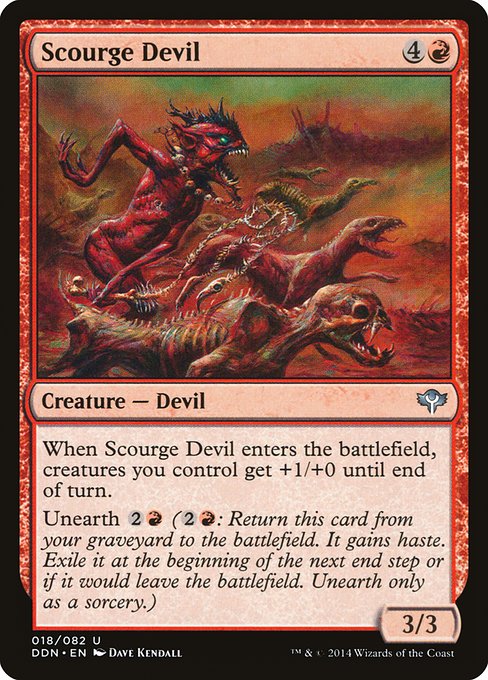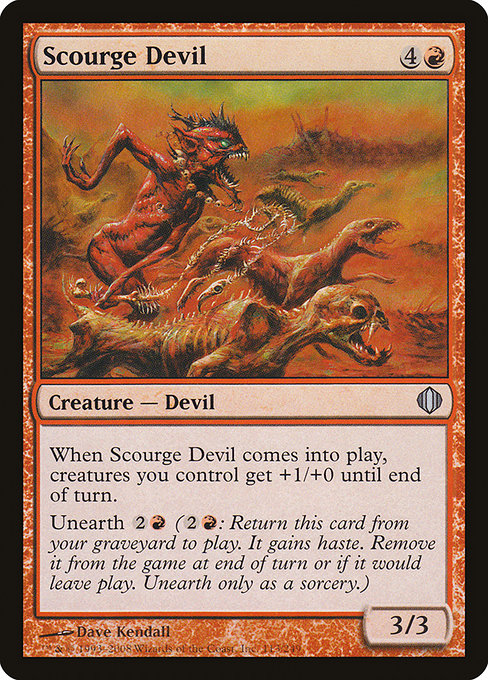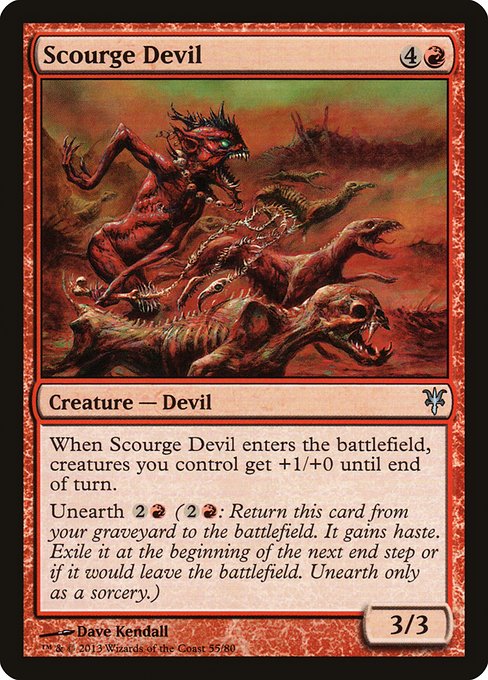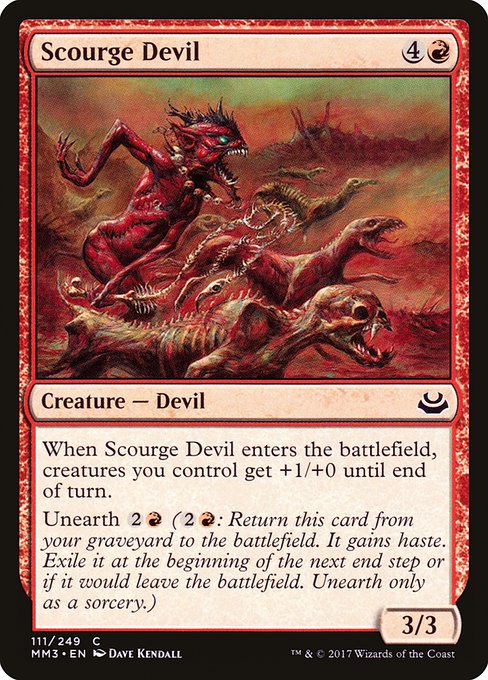Diable de la calamité
Créature : diable
Quand le Diable de la calamité arrive en jeu, les créatures que vous contrôlez gagnent +1/+0 jusqu'à la fin du tour.
Exhumation ( : Renvoyez en jeu cette carte depuis votre cimetière. Elle acquiert la célérité. Retirez-la de la partie à la fin du tour ou si elle devait quitter le jeu. N'exhumez que lorsque vous pourriez jouer un rituel.)
Exhumation ( : Renvoyez en jeu cette carte depuis votre cimetière. Elle acquiert la célérité. Retirez-la de la partie à la fin du tour ou si elle devait quitter le jeu. N'exhumez que lorsque vous pourriez jouer un rituel.)
3/3
standard
future
historic
gladiator
pioneer
explorer
modern
legacy
pauper
vintage
penny
commander
brawl
alchemy
paupercommander
duel
oldschool
premodern
Rulings
Activating a creature card’s unearth ability isn’t the same as casting the creature card. The unearth ability is put on the stack, but the creature card is not. Spells and abilities that interact with activated abilities (such as Stifle) will interact with unearth, but spells and abilities that interact with spells (such as Remove Soul) will not.
At the beginning of the end step, a creature returned to the battlefield with unearth is exiled. This is a delayed triggered ability, and it can be countered by effects such as Stifle or Voidslime that counter triggered abilities. If the ability is countered, the creature will stay on the battlefield and the delayed trigger won’t trigger again. However, the replacement effect will still exile the creature when it eventually leaves the battlefield.
If you activate a card’s unearth ability but that card is removed from your graveyard before the ability resolves, that unearth ability will resolve and do nothing.
Unearth grants haste to the creature that’s returned to the battlefield. However, neither of the “exile” abilities is granted to that creature. If that creature loses all its abilities, it will still be exiled at the beginning of the end step, and if it would leave the battlefield, it is still exiled instead.
If a creature returned to the battlefield with unearth would leave the battlefield for any reason, it’s exiled instead — unless the spell or ability that’s causing the creature to leave the battlefield is actually trying to exile it! In that case, it succeeds at exiling it. If it later returns the creature card to the battlefield (as Oblivion Ring or Flickerwisp might, for example), the creature card will return to the battlefield as a new object with no relation to its previous existence. The unearth effect will no longer apply to it.
Scourge Devil’s triggered ability affects only creatures you control at the time it resolves, including Scourge Devil itself. Creatures you begin to control later in the turn won’t get +1/+0.
At the beginning of the end step, a creature returned to the battlefield with unearth is exiled. This is a delayed triggered ability, and it can be countered by effects such as Stifle or Voidslime that counter triggered abilities. If the ability is countered, the creature will stay on the battlefield and the delayed trigger won’t trigger again. However, the replacement effect will still exile the creature when it eventually leaves the battlefield.
If you activate a card’s unearth ability but that card is removed from your graveyard before the ability resolves, that unearth ability will resolve and do nothing.
Unearth grants haste to the creature that’s returned to the battlefield. However, neither of the “exile” abilities is granted to that creature. If that creature loses all its abilities, it will still be exiled at the beginning of the end step, and if it would leave the battlefield, it is still exiled instead.
If a creature returned to the battlefield with unearth would leave the battlefield for any reason, it’s exiled instead — unless the spell or ability that’s causing the creature to leave the battlefield is actually trying to exile it! In that case, it succeeds at exiling it. If it later returns the creature card to the battlefield (as Oblivion Ring or Flickerwisp might, for example), the creature card will return to the battlefield as a new object with no relation to its previous existence. The unearth effect will no longer apply to it.
Scourge Devil’s triggered ability affects only creatures you control at the time it resolves, including Scourge Devil itself. Creatures you begin to control later in the turn won’t get +1/+0.
Rulings
Activating a creature card’s unearth ability isn’t the same as casting the creature card. The unearth ability is put on the stack, but the creature card is not. Spells and abilities that interact with activated abilities (such as Stifle) will interact with unearth, but spells and abilities that interact with spells (such as Remove Soul) will not.
At the beginning of the end step, a creature returned to the battlefield with unearth is exiled. This is a delayed triggered ability, and it can be countered by effects such as Stifle or Voidslime that counter triggered abilities. If the ability is countered, the creature will stay on the battlefield and the delayed trigger won’t trigger again. However, the replacement effect will still exile the creature when it eventually leaves the battlefield.
If you activate a card’s unearth ability but that card is removed from your graveyard before the ability resolves, that unearth ability will resolve and do nothing.
Unearth grants haste to the creature that’s returned to the battlefield. However, neither of the “exile” abilities is granted to that creature. If that creature loses all its abilities, it will still be exiled at the beginning of the end step, and if it would leave the battlefield, it is still exiled instead.
If a creature returned to the battlefield with unearth would leave the battlefield for any reason, it’s exiled instead — unless the spell or ability that’s causing the creature to leave the battlefield is actually trying to exile it! In that case, it succeeds at exiling it. If it later returns the creature card to the battlefield (as Oblivion Ring or Flickerwisp might, for example), the creature card will return to the battlefield as a new object with no relation to its previous existence. The unearth effect will no longer apply to it.
Scourge Devil’s triggered ability affects only creatures you control at the time it resolves, including Scourge Devil itself. Creatures you begin to control later in the turn won’t get +1/+0.
At the beginning of the end step, a creature returned to the battlefield with unearth is exiled. This is a delayed triggered ability, and it can be countered by effects such as Stifle or Voidslime that counter triggered abilities. If the ability is countered, the creature will stay on the battlefield and the delayed trigger won’t trigger again. However, the replacement effect will still exile the creature when it eventually leaves the battlefield.
If you activate a card’s unearth ability but that card is removed from your graveyard before the ability resolves, that unearth ability will resolve and do nothing.
Unearth grants haste to the creature that’s returned to the battlefield. However, neither of the “exile” abilities is granted to that creature. If that creature loses all its abilities, it will still be exiled at the beginning of the end step, and if it would leave the battlefield, it is still exiled instead.
If a creature returned to the battlefield with unearth would leave the battlefield for any reason, it’s exiled instead — unless the spell or ability that’s causing the creature to leave the battlefield is actually trying to exile it! In that case, it succeeds at exiling it. If it later returns the creature card to the battlefield (as Oblivion Ring or Flickerwisp might, for example), the creature card will return to the battlefield as a new object with no relation to its previous existence. The unearth effect will no longer apply to it.
Scourge Devil’s triggered ability affects only creatures you control at the time it resolves, including Scourge Devil itself. Creatures you begin to control later in the turn won’t get +1/+0.
Votre collection ? vos decks ?
Envie de gérer votre collection et/ou créer des decks ?



 0
0
 0.23€
0.23€


